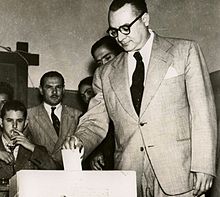
Constituent Assembly elections were held in Venezuela on 27 October 1946, [1] following a coup the year before which launched El Trienio Adeco. [2] They were the first free national elections in the country's history.
Contents
Democratic Action, which had led the provisional government formed after the coup, won a decisive victory with 137 of the 160 seats in the Assembly. Voter turnout was 86.6%. [3] The assembly drafted a constitution ahead of the country's first free regular elections a year later.


